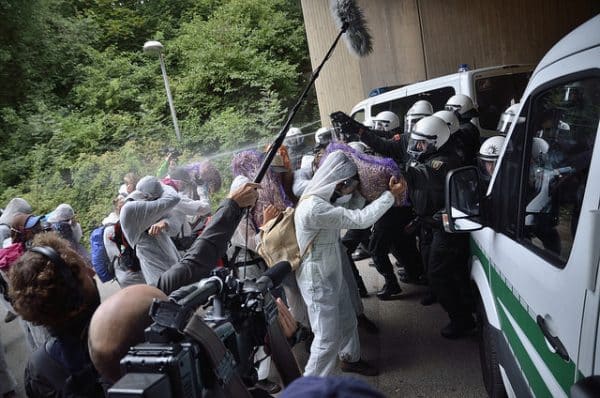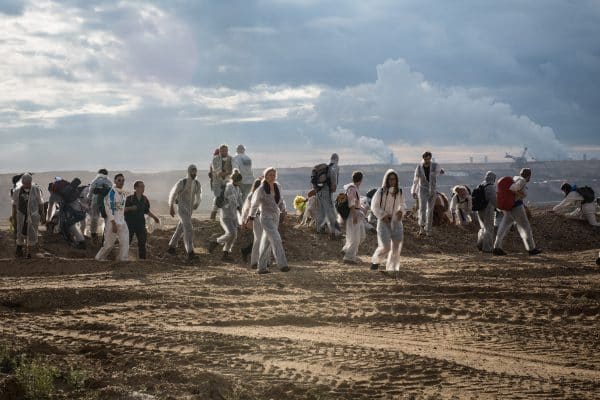It’s happening: 2016 is the year of climate disobedience
=By= Kara Moses

Ende Gelände – Here and No Further. Tim Wagner, 350.ORG
Is issue cohesion finally catching on? We can hope so as it seems to be reflected in the climate protests happening in Europe. The protestors are also getting smart about dressing defensively to protect themselves from pepper spray. “Reclaim the Power” successfully shut down the UK’s largest open air coal mine. -rw
Something truly incredible is happening. We’re only half way through it, but 2016 is a record-breaking year. The second week of May was extraordinarily spectacular, with records being smashed left right and centre. As tens of thousands of people took direct action in the biggest ever global wave of civil disobedience targeting the world’s largest fossil fuel infrastructure projects, energy produced from renewables soared to new heights while coal collapsed to an all-time low, multiple global temperatures records were smashed by the biggest margins ever and Arctic sea ice fell to its lowest ever extent for May.
The ‘Break Free’ fortnight of action kicked off with Reclaim the Power shutting down the UK’s largest opencast coal mine, and went on to see 4,000 people shut down one of Germany’s largest coal mines and power plants for three days; 2,000 people brought the world’s largest coal port in Australia to a standstill, and major refineries, rail infrastructure, pipelines, power stations and banks were shut down and disrupted. People took bold action in countries with repressive regimes; Turkey, Nigeria, Brazil, South Africa. The Philippines and Indonesia saw some of the biggest mobilisations, with 10,000 people marching to oppose a new coal-fired power plant in Batangas.
Historic turning point
As thousands stepped up to demand an end to fossil fuels and a switch to renewables, across multiple countries their demands were lived out in reality. In remarkable synchronicity, and what some experts have described as a ‘historic turning point’, coal generation fell to zero in the UK for the first time in over 100 years. This happened four times in a week (the same week as Break Free) having previously never happened since the first coal-fired generator opened in London in 1882. (This follows a record-breaking day one month earlier when, for the first time, solar produced more power than coal for a full 24 hours). In the same week, Germany’s renewables supply met the country’s demand (on the third day of occupation of the coal mine and power station), while Portugal ran on renewables for more than four days straight .
Stark reminder
It wasn’t all good news though. As a stark reminder of why this sea change is so urgently needed, that same week NASA declared that 2016 was set to be the hottest year ever, probably by the largest margin ever, as April was confirmed to be the hottest April on record – the seventh month in a row to have broken global temperature records, and smashing the previous record for April by the largest margin yet. This was the third month in a row that the monthly record had been broken by the largest margin ever. When the string of record-smashing months started in February, scientists started talking about a ‘climate emergency’.
This came just days after news of the world reaching a ‘point of no return’ with global concentrations of carbon dioxide reaching the 400 parts per million (ppm) milestone at two important measuring stations, one of which (Cape Grim, Australia) sits in a region of stable CO2 concentrations – climate scientists believe it will never again fall below that point. There is no going back now, a grim forecast indeed.
Global temperatures may be increasingly rising but so are we
The record temperatures of recent months are wreaking havoc with ecosystems across the world; a more literal sea change triggered the third recorded global coral bleaching, affecting 93% of the Global Barrier Reefs. In the northern parts of the reef, it’s expected the majority of coral is dead. Meanwhile Arctic sea ice falls to its lowest ever extent for the month of May, prompting fears that this year could set the record of worst ever summer sea ice melt.
Remarkably also during the Break Free fortnight, Shell spilled nearly 90,000 gallons in the Gulf of Mexico – the largest amount of oil since BP’s 2010 Deepwater Horizon disaster – just shy of qualifying as a ‘major’ spill under the Coast Guard’s classification system.
All this happened in the space of one fortnight. The fortnight the climate justice movement has been talking about for nearly a year, just the beginning of the promised ‘escalation’ after the Paris agreement which was predictably inadequate to address the scale of the problem. World governments may have agreed to limit warming to 1.5C but with no legal obligations and no commitments to end fossil fuels, it’s up to us to keep it in the ground. And around the world, people are doing just that and taking matters into their own hands.
Global temperatures may be increasingly rising but so are we. More and more people are willing to take increasingly greater risks for climate justice, as Break Free demonstrated. And studies of successful movements show that when more people start taking greater risks for an issue, it mobilises bigger audiences. We need to keep up this pressure to continue escalating the climate justice movement past tipping point. More bold actions will mobilise more people.
On the streets of Paris, and at the coal mine in Germany, a catchy French chant rang out frequently, defiantly: ‘On est plus chaud, plus chaud, plus chaud que le climat’. ‘We’re hotter, hotter, hotter than the climate’ (the spirit of it is somewhat lost in written English…). The climate may be hotter than it has ever been, but so is the climate movement.

Ende Gelände – Here and No Further. Reuben Neugebauer, 350.ORG
Having recovered from the post ‘Hopenhagen’ hangover, the climate justice movement is not only growing, it is evolving. There’s still a long way to go, but the movement is increasingly making the links between environmental, social and economic issues. Justice is increasingly a core part of the demand and the voices of communities on the frontline of climate impacts are being heard more loudly, led by groups such as Wretched of the Earth and Movement for Justice.
The injustice of climate change, largely caused by rich white people and the impacts most severely felt by poor black and brown people, is a continuation of colonialism, a link being more clearly articulated now more than ever, alongside links to inequality, austerity, war and terrorism. The ‘red lines’ meme from Paris – representing minimum limits for a just and liveable planet – has continued at protests in coal mines, nuclear weapons factories, justice for migrants protests, court solidarity demos and many more. Historically, movements that have coherently joined the dots between systemically linked issues have also seen success.
If we really want climate justice, then as a society disobedience in the name of justice must be normalised; we must support rather than denounce those willing to put themselves on the line. We are in this process already, and right now it looks like we are winning. Test fracking may be taking place in the UK for the first time in five years, but there is a large and highly organised grassroots resistance ready to respond. A decision on whether to expand Heathrow or Gatwick hangs in the balance but there’s fierce opposition on all sides. Plans are currently being made by Reclaim the Power to pick up where the Heathrow 13 left off with a mass action at a major UK airport in September to demand no new runways – anywhere.
Another world is possible – we glimpsed it in May. The best and the worst of it – what we stand to lose and how record breaking temperatures could become the norm. We also saw what happens when people come together in great numbers. We are more powerful than we can imagine. The synchronicity of all these events may be nothing more than a remarkable coincidence. But it is symbolic of where we stand and where we must go from here. We must continue breaking records. Not of global temperatures, or gallons of oil spilled into the ocean, but of more people taking action for climate justice. 2017 is hailed to be the year the door to reach two degrees closes forever. 2016 must be the year of mass climate disobedience. 2016 must be the year we are hotter than the climate.
Note to Commenters
Due to severe hacking attacks in the recent past that brought our site down for up to 11 days with considerable loss of circulation, we exercise extreme caution in the comments we publish, as the comment box has been one of the main arteries to inject malicious code. Because of that comments may not appear immediately, but rest assured that if you are a legitimate commenter your opinion will be published within 24 hours. If your comment fails to appear, and you wish to reach us directly, send us a mail at: editor@greanvillepost.com
We apologize for this inconvenience.
 Nauseated by the
Nauseated by the
vile corporate media?
Had enough of their lies, escapism,
omissions and relentless manipulation?
Send a donation to
The Greanville Post–or
But be sure to support YOUR media.
If you don’t, who will?